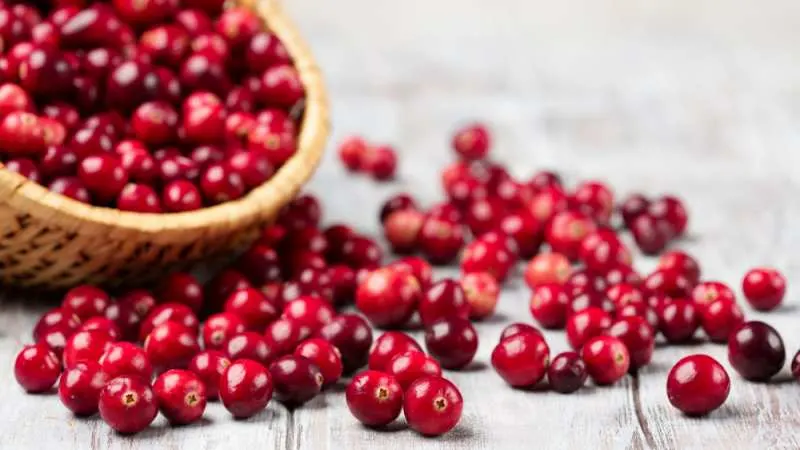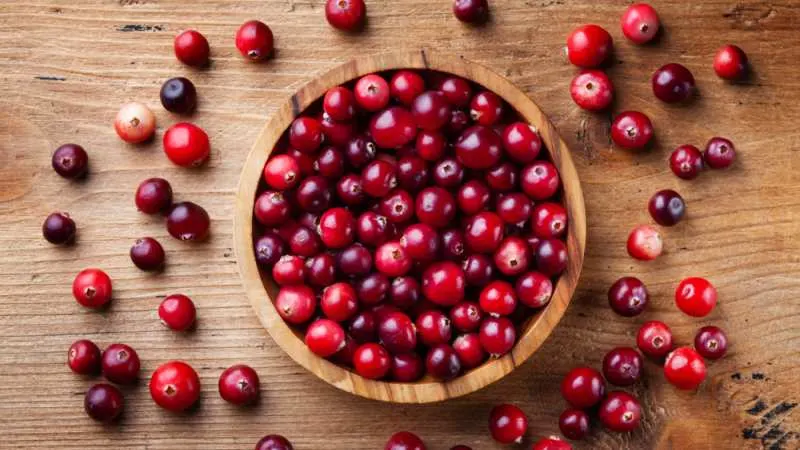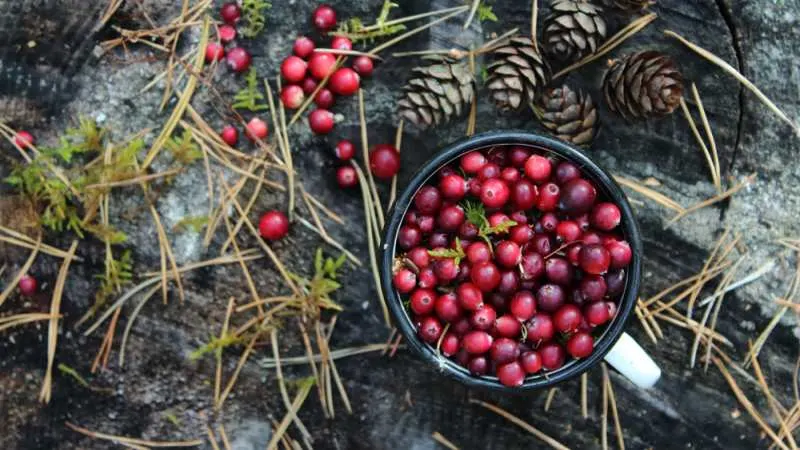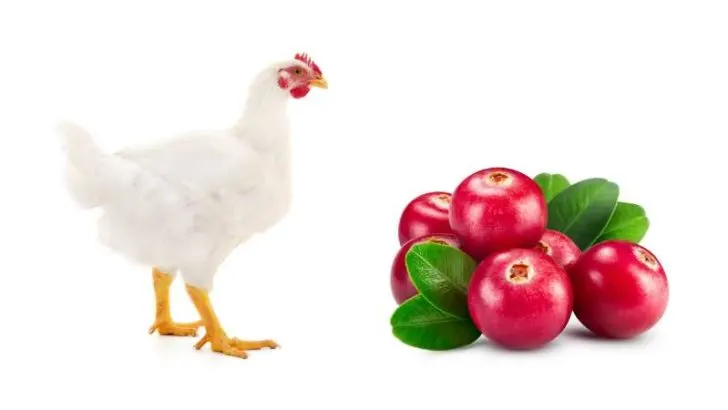It’s the holiday season – which means you can find cranberries pretty much everywhere. They’re pretty popular year-round – but mainly around wintertime.
Because of cranberries’ flavor and taste, it is generally put into drinks, sauces, desserts, added as stuffing, and so on. Cranberries – whether fresh or dried – are a tasty superfood.
Can chickens eat cranberries, though? Are they safe or perhaps, even beneficial to chickens?
Yes, you can give cranberries to your hens. They do adore them. They’ll gladly eat it from your hands – whether they’re dried, fresh, or cooked!
They not only offer them lots of beneficial nutrients, but they also taste delicious – taking their taste buds on a thrilling and exciting journey that your chickens might not get from their regular diet.
Stick around to learn more!

Nutritional Facts About Cranberries
Before giving any food to your flock, it’s always a good idea to research what’s beneficial – and nutritious – for them. That’s how you’ll ensure that your chickens only nibble on healthy foods.
That said, here are the nutritional facts about cranberries that can be very beneficial to your hens.
The information is for 100 grams of raw cranberries:
| Name | Amount |
|---|---|
| Fiber | 3.5 g |
| Energy | 45 kcal |
| Sugar | 4.27 g |
| Protein | 0.46 g |
| Fat | 0.13 |
| Vitamin E | 1.30 mg |
| Vitamin C | 14 mg |
As you can see from the table, there’s a considerable amount of nutrients in only one cup of this fruit.
Low Levels Of Sugar, Fat, And Energy
In general, maintaining moderate sugar and fat levels helps guarantee that your flock keeps a healthy and average weight. Other snacks are frequently the cause of your flocks’ obesity.
So, it’s good to know that cranberries are harmless – but only in moderation.
Cranberries Are High In Fiber
Fiber is essential for various biological processes, the most significant of which is the chicken’s development and the maintenance of good digestion.
Cranberries assist your hens in maintaining a regular and healthy bowel movement and keeping them from feeling bloated.
In short, fiber is the substance that prevents constipation in your hens – and cranberries are full of them.
High Vitamin C And Vitamin E Levels
Hearing about high vitamin C levels has always been a positive thing when it comes to nutrition. It supports the strengthening of the body’s immune system – and helps your flock keep their heads and bodies cool when things become a little stressful for them.
Vitamin E is not commonly found in foods, but it is one of the rare assets found in cranberries – which is another plus.
It promotes proper flock growth and strengthens the defensive mechanism of chickens’ bodies. Furthermore, it aids the neurological and defense systems, assisting hens in overcoming some ailments.
Antioxidants
Antioxidants can combat free radicals, which – when left unchecked and allowed to accumulate – cause chronic diseases in chickens. These disorders will generally affect their bones or hearts.
These antioxidants aid in preventing free radicals from wreaking havoc on the chicken’s health – the same way they do for you.
Reduces Urinary Tract Infections
Also, another great thing is that cranberries are beneficial in treating lower urinary tract infections. As a result, you can help keep your hens protected from E.Coli – which has been linked to UTIs.

Cranberries For Chicken: Feeding Recommendations
When it comes to food, chickens are generally neither choosy nor finicky. And that means that you shouldn’t have any problems – or see any berries left – regardless of how you offer them.
Many hens go wild about this fruit, sometimes even pecking at their owners in anticipation. With that said, it’s also possible that your chickens won’t enjoy eating them – or that part of your flock would ignore them in favor of their usual food.
Any of these scenarios is acceptable.
Remember that, much like you and others have different preferences regarding how cranberries are prepared, your chickens might, too.
Here are various ways to make cranberries that your hens will likely enjoy.
Fresh Cranberries
You can simply spread some fresh cranberries inside your flock’s area. It’s up to you to cut them or not. However, cutting them is the preferred option because it makes digestion easier – chickens lack teeth and won’t chew up the berries on their own.
So, it’s best to slice the cranberries into small pieces around the size of their regular feed. You may put them someplace where the water or juices won’t be wasted significantly. That liquid is high in nutrients, too!
Dried Cranberries
You might be wondering if hens enjoy dried cranberries. Here’s your answer:
Yes, your chicken can eat dried cranberries – and they typically love them!
Keep in mind that dried cranberries that have been processed might contain extra sugar levels and preservatives. These additional ingredients could reduce – or eliminate – the nutritious and beneficial side of this delicious snack for your hens.
As a result, avoiding processed dried cranberries is preferable.
It’s better to buy fresh cranberries and dry them yourself if you can. That way, you can ensure that the cranberries aren’t mixed with any artificial additives. It’s essential to maintain as many nutrients as possible in the fruit.
Also, remember that dried fruits are much easier to oversupply and over-consume for chickens.
They’re much smaller now that all the water’s gone. And that means that 100 grams of dried cranberries aren’t the same as 100 grams of fresh cranberries.
Granted, they still include all of the minerals and fiber that their organism requires, but you must be cautious about the amounts and caloric intake.
Cooked Cranberries
You can also boil the cranberries to soften them. They taste nearly identical to fresh ones – the only difference here is the consistency of your cranberries, as baked ones have a softer texture.
Nonetheless, slicing them is something you’d want to do.
Also, make sure the cranberries are cooled before serving them. You don’t want to burn your chickens, do you?
Your Home-Grown Berries
If you’re fortunate to have a garden and grow a cranberry bush, you can absolutely feed your chickens directly from it!
Your birds might even eat the cranberries off the ground as they fall around. That’s fantastic as it encourages natural foraging behaviors.
But again, you must exercise caution to ensure that they don’t overeat every chance they get.
Mixed
Another thing to consider preparing is a healthy chicken-friendly berry trail mix or a combination of cranberries with other veggies and fruits or their primary pellet meal.
It’s an excellent method for increasing consumption while avoiding the formation of preferences.

Can Chickens Eat A Lot of Cranberries?
Well, no.
Because fruits are not a staple food for chickens – instead, they are tasty treats – cranberries should be given to hens sparingly and never constantly. You should try to give them to your hens no more than once per week.
Aim for 30 grams of cranberries per bird, which would be around 3-5 cranberries each at a time. However, you must also ensure that all birds can get to them – and that no single bird consumes them all. That’s the tricky part.
You see, while cranberries provide a lot of nourishment, they are not a suitable part of chickens’ everyday diet and do not provide all a chicken requires – such as healthy fats and protein.
In a nutshell, cranberries can’t match a chicken’s dietary needs.
Plus, frequent cranberry consumption might create intestinal issues in your chickens, especially in higher amounts.

Preparing Food For Your Chickens
Apart from controlling their cranberry intake and restricting the amount you provide, it’s equally important to examine your chicken’s weight and their general health condition.
You must alter the amount you provide them based on their condition and size. So, for instance, hens with smaller body frames require fewer cranberries.
Another factor to consider is their sugar consumption.
Since hens might get overweight from eating too much sugar and fat, it’s essential to limit their intake of sugary fruits. It makes sense to keep it to a minimum.
Hens, naturally, peck and consume anything you offer them – as well as anything they may find appetizing in their domain.
Don’t feed your chicken spoiled food if you want to ensure it’s getting all the nutrients it needs. While overripe and overly soft fruits and vegetables are okay, rotten and moldy ones should be avoided.
These substances can be harmful to your hens.
Last but not least, give your hens some diversity.
While hens will happily eat anything you serve them regularly, a variety of flavors keeps them happy. Giving them new – and healthy – foods also enables them to expand their culinary pallet, on top of providing them with extra nutrition.
You might be asking, “When is the best time to offer berries to my hens?”
Well, hens should generally eat fruits in the morning. The fruits they eat can be readily absorbed during these periods.

Conclusion
Fruits are highly beneficial to hens.
It provides nutrients that they might not get from their usual feeding. Other than that, chickens may enjoy trying out new flavors and yummy treats.
With that said, can chickens eat cranberries?
They certainly can. In reality, this is the type of food you should strive to give regularly – albeit in limited amounts. On that note, the recommended servings shouldn’t exceed 30 grams once a week.
They are among the most nutritious and healthy treats you can provide, and hens typically enjoy them. Plus, they’re inexpensive, widely accessible, easy to store – and can be served in various ways.
So, if you were previously concerned, rest assured that this fruit is an excellent choice for your flock!

